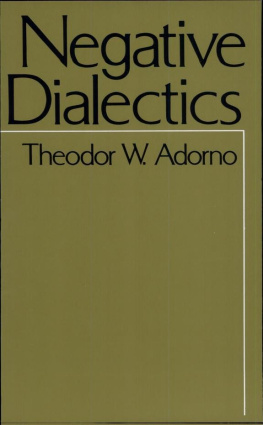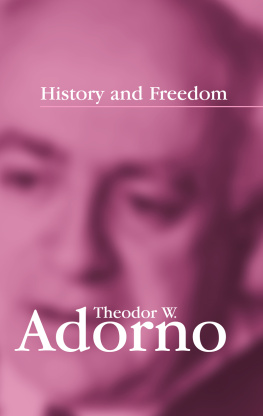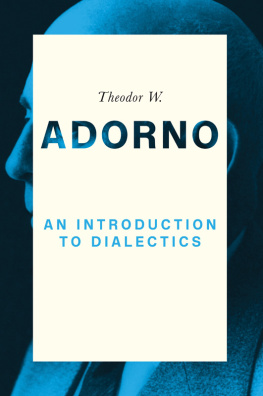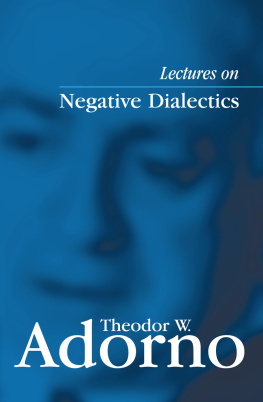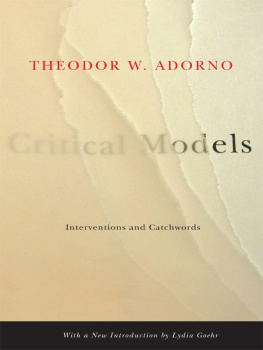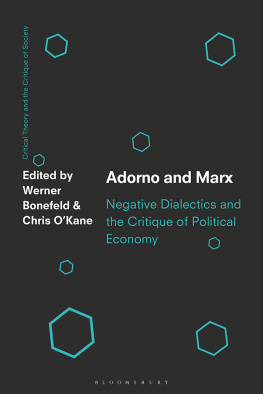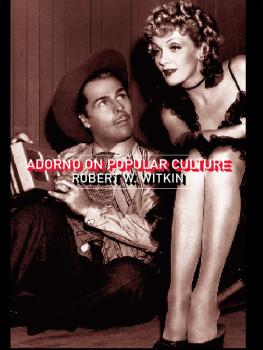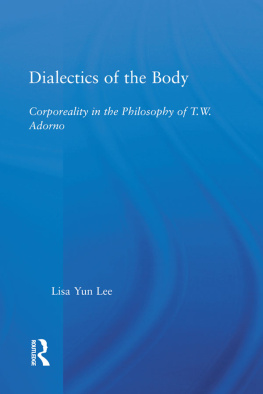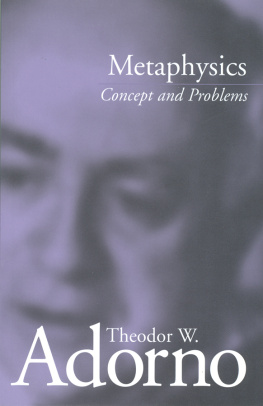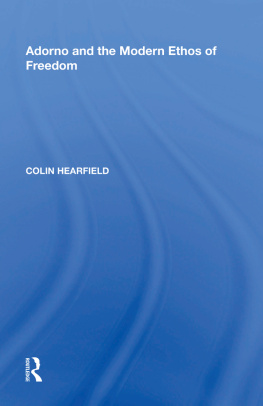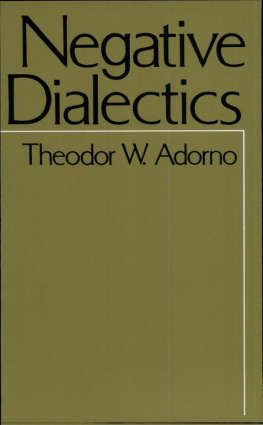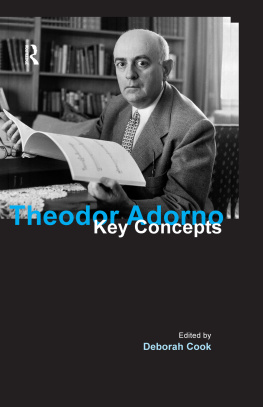Negative Dialectics
By Theodor Adorno
Suhrkamp Verlag 1970 Frankfurt am Main
Original text is copyright
1997 by Suhrkamp Verlag.
The text of this translation is copyright
2001 Dennis Redmond
Prologue
The formulation negative dialectics transgresses against tradition. Already in Plato dialectics intended to establish something positive through the thought-means of the negation; the figure of a negation of the negation named this precisely. The book would like to emancipate dialectics from these types of affirmative essence, without relinquishing anything in terms of determinacy. The development of its paradoxical title is one of its intentions.
What in accordance with the conception of philosophy would be the foundation, the author develops only after a great deal of explication of what that conception presumes would be raised on a foundation. This implies the critique of the concept of the foundation, as well as of the primacy of substantive thought. Its self-consciousness achieves its movement solely in its consummation. It requires what, according to the ground rules of the Spirit which always remain in effect, is secondary.
What is given herein is not solely a methodology of material labor of the author; according to the theory of negative dialectics, no continuum exists between the former and the latter. However such a discontinuity, and what instructions may be read out of it for thinking, will indeed be dealt with. The procedure is not grounded, but justified. The author lays, so far as he can, his cards on the table; this is by no means the same thing as the game.
When Benjamin in 1937 read the part of the Metacritique of Epistemology which the author had finished at that time the last chapter of the published work he commented, one had to journey through the icy wasteland of abstraction in order to definitively arrive at concrete philosophizing. Negative dialectics now indicates such a path, retrospectively. Concretion was for the most part smuggled into contemporary philosophy. By contrast the largely abstract text wishes to vouch for its authenticity no less than for the explanation of the authors concrete mode of procedure. If one speaks in the newest aesthetic debates of anti-drama and anti-heroes, then Negative Dialectics , which holds itself distant from all aesthetic themes, could be called an anti-system. With logically consistent means, it attempts to put, in place of the principle of unity and of the hegemony of the supra-ordinated concept, that which would be outside of the bane of such unity. Since the author has trusted himself to follow his own intellectual impulses, he felt it to be his task to break through the delusion of constitutive subjectivity by means of the power of the subject; he no longer wished to put off this task. To reach stringently across the official division of pure philosophy and what is relevant to the matter [Sachhaltigem] or what is formally scientific, was one of the determining motives therein.
The introduction expounds the concept of philosophical experience. The first section starts out from the state of the ontology which dominates today in Germany. It is not judged from above, but is comprehended out of its need, which is no less problematic for its part, and criticized immanently. The second section proceeds from the results to the idea of a negative dialectics and its position in relation to several categories, which it preserves as well as qualitatively transforms. The third section then carries out models of negative dialectics. They are not examples; they do not simply illuminate general considerations. By leading towards what is relevant to the matter, they would like to simultaneously do justice to the substantive intention of what is at first dealt with generally, out of necessity, in contrast to the usage of examples as something indifferent in themselves, which Plato introduced and which philosophy has ever since merely repeated. While the models are supposed to clarify what negative dialectics would be, and to drive this latter, according to its own concept, into the realm of reality, they elucidate, not dissimilar to the so-called exemplary models, key concepts of philosophical disciplines, in order to centrally intervene in these. A dialectics of freedom will do this for the philosophy of ethics; World-Spirit and Natural History for that of history; the last chapter circles, feeling its way, around metaphysical questions, in the sense of the axial revolution of the Copernican turn, by means of critical self-reflection.
Ulrich Sonneman is working on a book which is supposed to be entitled Negative Anthropology . Neither he nor the author knew beforehand about the coincidence. It refers to a compulsion in the thing itself.
The author is prepared for the resistance, which Negative Dialectics will provoke. Without rancor, he does not begrudge the joy of all those, both hither and yonder [i.e. on both sides of the Berlin Wall], who will proclaim that they had always said it and now the author would be confessing it.
Frankfurt, Summer 1966
Introduction
On the Possibility of Philosophy 15-16
Philosophy, which once seemed outmoded, remains alive because the moment of its realization was missed. The summary judgement that it had merely interpreted the world is itself crippled by resignation before reality, and becomes a defeatism of reason after the transformation of the world failed. It guarantees no place from which theory as such could be concretely convicted of the anachronism, which then as now it is suspected of. Perhaps the interpretation which promised the transition did not suffice. The moment on which the critique of theory depended is not to be prolonged theoretically. Praxis, delayed for the foreseeable future, is no longer the court of appeals against self-satisfied speculation, but for the most part the pretext under which executives strangulate that critical thought as idle which a transforming praxis most needs. After philosophy broke with the promise that it would be one with reality or at least struck just before the hour of its production, it has been compelled to ruthlessly criticize itself. What once, against the appearance [Schein] of the senses and every outwards-oriented experience, felt itself to be that which is purely unnaive, has for its part become as naive as those miserable candidates Goethe received a hundred and fifty years ago, who nourished themselves on speculation. The introverted thought-architect lives behind the moon which extroverted technicians have confiscated. In the face of an immeasurably expanded society and the progress of positive cognition of nature, the conceptual structures in which, according to philosophic mores, the totality is supposed to be housed, resemble remnants of simple commodity society amidst industrial late capitalism. The meanwhile completely mismatched relationship (since degraded to a mere topos) between each Spirit and power, strikes the attempt to comprehend this hegemony by those inspired with their own concept of the Spirit with futility. The very will to do so betokens a power-claim which countermands what is to be understood. The retrogression of philosophy to a narrow scientific field, rendered necessary by the rise of specific scientific fields, is the single most eye-opening expression of its historical fate. Had Kant, in his words, freed himself from the scholastic concept of philosophy into its world-concept, then this has regressed under compulsion to its scholastic concept. Where it confuses this latter with the world-concept, its pretensions degenerate into sheer ludicrousness. Hegel knew this, in spite of the teaching of the absolute Spirit to which he assigned philosophy, as a mere moment of reality, as an activity in the division of labor, and thereby restricted it. Since then, its own narrowness and discrepancy to reality has emerged out of this, and all the more so, the more thoroughly it forgot this delimitation and expunged it from itself as something alien, in order to justify its own position in a totality which it monopolizes as its object, instead of recognizing how very much its immanent truth depends on such, down to its innermost composition. Only the philosophy which dispenses with such naivete is the slightest bit worth thinking further. Its critical self-reflection may not stop however before the highest achievements of its history. It needs to be asked if and whether, following the collapse of the Hegelian one, it would even be possible anymore, just as Kant investigated the possibility of metaphysics after the critique of rationalism. If the Hegelian doctrine of the dialectic represented the impossible goal of showing, with philosophical concepts, that it was equal to the task of what was ultimately heterogenous to such, an account is long overdue of its relationship to dialectics, and why precisely his attempt failed.

